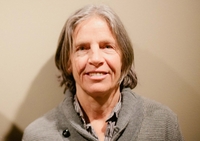These two new books give ample evidence of the strengths and idiosyncrasies of this popular New York poet, who is probably best known (at least to the MTV crowd) for having run for president in 1992. The longer collection, Skies, beautifully portrays the sweet metaphysical tragedy of having to bear lonely witness to one's own experiences. In an untitled poem beginning "The whole mess/ of it troubles me" (recalling Williams's "It's the anarchy of poverty/ that delights me"), Myles seems deep in the zone of this Heraclitean flux: "There's clouds/ painted on clouds/ is rusty russet/ the sky now, smooth/ like old cream..../ Our moments are/ so damn fast the/ turn of the boat/ my clumsy pen/ my heart beating...." The painterly description practiced by significant influences Frank O'Hara and James Schuyler gets dropped, compressed and narrowed into two-plus word lines that supercharge their openness, adventurousness and charisma, drawing in any new idiom, trashy or otherwise, that might have just been loosed on the streets: "The moon is/ so
not a/ star," begins one poem. An essay in On My Way, "The End of New England," is even more colloquial ("That was the motto, the notion I heard in a talk by Avitall Ronnell about five years ago. Do you know her she's a theory person she was very stylish for a while..."), and that book as a whole seems designed to point up Myles's shifting, often quite intimate forms of address. Myles might be threatened with a sort of Bukowski-esque ghettoization, considering her ability to be incredibly interesting, to be the native informant of a life lived punkily on the streets, but her speaker is simply having the best of both worlds, as working-class Bostonian and New York aesthete. (Feb.)
Forecast:Myles recently published a memoir of her Boston childhood, adolescence and coming to queerdom entitled
Cool for You (Soft Skull). The Black Sparrow book is the longer and more handsomely produced of these two new poetry collections, but Myles's considerable following will seek out both.


